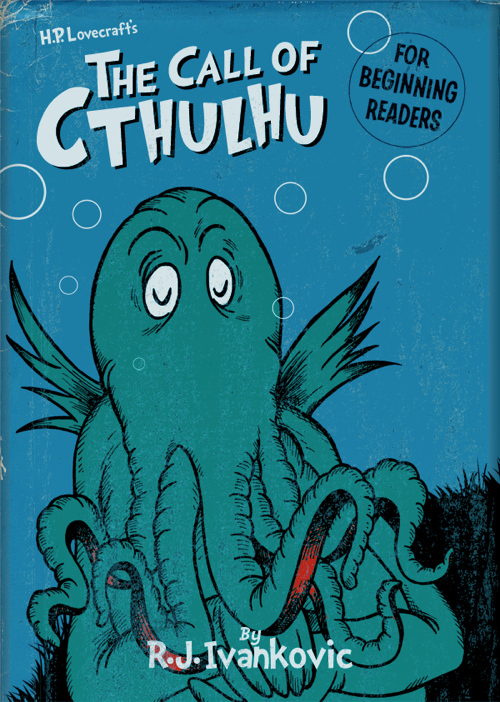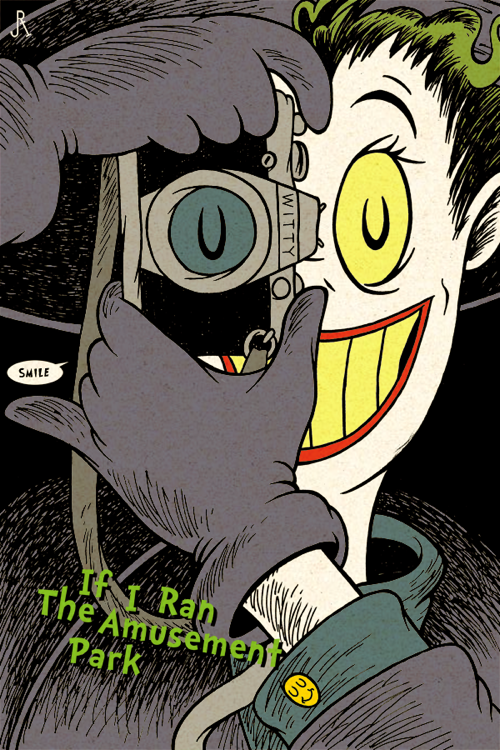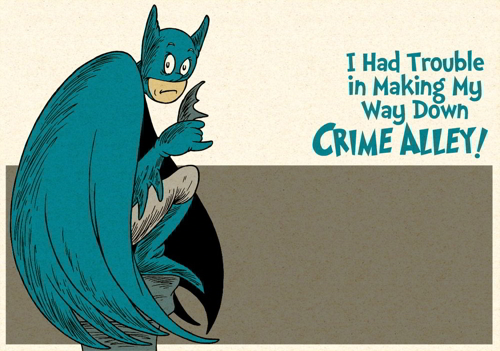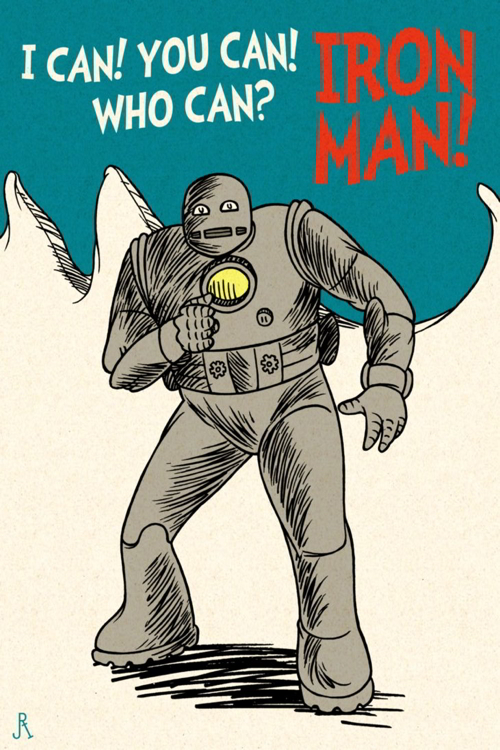 Somewhere deep in the bowels of the Internet, unbeknownst to all but the initiated, there’s an organisation that calls itself the Really Very Serious Alan Moore Scholars’ Group. Occasionally they get to actually communicate with the object of their adoration, The Great Moore himself. The most recent manifestation was in December 2015, when The Master […]
Somewhere deep in the bowels of the Internet, unbeknownst to all but the initiated, there’s an organisation that calls itself the Really Very Serious Alan Moore Scholars’ Group. Occasionally they get to actually communicate with the object of their adoration, The Great Moore himself. The most recent manifestation was in December 2015, when The Master […]
Viewing: Blog Posts Tagged with: Lovecraft, Most Recent at Top [Help]
Results 1 - 7 of 7
Blog: PW -The Beat (Login to Add to MyJacketFlap)
JacketFlap tags: End of the World, Lovecraft, The Show, nemo, Alan Moore, Dagon, Providence, Literary Comics, Heart of Ice, Top News, Top Comics, HPL, Thomas Ligotti, FHTAGN!, Jacen Burrows, Jimmy's End, Neonomicon, Nyarlathotep, Pärnu-Jaagupi, Robert Aickman, Interviews, Books, Uncategorized, Comics, Cthulhu, Avatar, Culture, Breaking News, Add a tag
Blog: The Mumpsimus (Login to Add to MyJacketFlap)
JacketFlap tags: Revelator, Online fiction, Lovecraft, Eric Schaller, Meghan McCarron, Laird Barron, Add a tag
The latest issue of The Revelator is now online. Eric Schaller and I put this one together with love and craft. It includes new short stories by Meghan McCarron and Laird Barron, poems by Sonya Taaffe, comix by Chad Woody, a column on music by Brian Francis Slattery, art by Adam Blue, miniatures used in the movie The Whisperer in Darkness, a previously-unpublished interview with H.P. Lovecraft that Nick Mamatas discovered, etc. Once again, we have, we believe, fully embodied our motto: The Truth ... And All.
The easiest way to keep apprised of the always-unpredictable, regularly irregular schedule of The Revelator is via our Facebook page.
Blog: PW -The Beat (Login to Add to MyJacketFlap)
JacketFlap tags: Art, Batman, lovecraft, dr s, Add a tag

DrFaustusAU is (as you might guess) an Australian artist. What you might not guess is his speciality—mash-ups in the style of Dr Seuss. He’s previously gained fame for his adaptation of THE CALL OF CTHULU in Seuss-style, and a series of Batman postcards. And now he’s turned to Iron Man.



Funny how that “Seuss Blue” makes everything kinda spooky.
Blog: The Mumpsimus (Login to Add to MyJacketFlap)
JacketFlap tags: Music, video, Lovecraft, Add a tag
I'm too busy to actually write anything that requires thought, so instead I will give you my favorite encounters with YouTube this week, both from British TV:
An inspiring triumph over preconceptions. (No, not my favorite song by a long shot, but a moment to be treasured.)
Cthulhu Mastermind.
Blog: Eric Orchard (Login to Add to MyJacketFlap)
JacketFlap tags: pen and ink, lovecraft, Add a tag
Blog: The Written Nerd (Login to Add to MyJacketFlap)
JacketFlap tags: YouTube, Lovecraft, songs stuck in my head., Add a tag
Lots of work to do today, so I'll just share with you some of the random tunes stuck in my head.
I love that the fans of early 20th century horror writer H.P. Lovecraft -- purple-prose writing, misanthropic, paranoid, and kinda racist (check out his descriptions of the "swarthy races" of Brooklyn if you doubt me) -- are themselves such a fun-loving and cheeky bunch. On the McNally Jackson blog the other day, Dustin posted a video touting the benefits of "Eldritch Sign", a product designed to thwart, um, some sort of floaty Lovecraft monsters, much to the bewilderment of the customer/participants. It's pretty funny. But my favorite Lovecraft homage will always be this:
Good luck getting that (or its Christmassy counterpart) out of your head. Ha! Happy Friday.
Blog: The Mumpsimus (Login to Add to MyJacketFlap)
JacketFlap tags: New England Review, Lovecraft, essays, Delany, literary magazines, Add a tag
When we were working on the first volume of Best American Fantasy, I said to Jeff and Ann that I wished we could reprint some nonfiction, because some of the most wondrous things I'd encountered were essays. I had New England Review at the forefront of my mind when I said this, because I sit down and read each issue that arrives immediately, and most of what excites me is the eclectic nonfiction they publish (which is not to say the poems and stories they publish are not exciting, too; many are, and I've passed some on to Ann and Jeff. Yes, we're still working on BAF 2, the "patience is a virtue" edition...)
The latest issue of NER contains an essay by J.M. Tyree, "Lovecraft at the Automat". It's not an essay that will offer too much that's new to a Lovecraft devotee, I expect, but I'm only a casual Lovecraftian, and generally more interested in his life and circumstances than in his writing. It's fun, though, to see a journal like NER giving pages to a serious look at Lovecraft in an essay that more than once references not only Richard Wright, but also China Miéville.
The essay is mostly about Lovecraft's brief time in New York, its effect on his racism and xenophobia, the manifestations of that racism and xenophobia in his writing, and how such attitudes, transmogrified into cosmic terrors, become general enough to appeal to any of our own insecurities and neuroses. The essay begins:
In his 1945 memoir Black Boy, Richard Wright describes how as a child he became addicted to the pulp fiction supplement of a racist white newspaper. What Wright loved was reading a "thrilling horror story" in the magazine section of a Chicago paper "designed to circulate among rural, white Protestant readers." There is no reason to suspect that Wright was reading H.P. Lovecraft -- in fact, the habit was probably acquired before Lovecraft began to publish. But Wright's sense of shock and recognition when the awful truth dawns on him parallels the feelings many readers have when they discover the racism that manifests itself in Edgar Allan Poe or Lovecraft.Later:
There is a poignancy in Wright's generosity and gratitude to such stories that implies an essential role for them in his overall intellectual growth. Could we borrow or adapt this notion from Wright for a more judicious reading of Lovecraft? It is almost as if pulp fiction, by hinting at the possibility of other worlds, whether real or fantastic, cannot help but liberate a young mind hungering for something different from the everyday reality in which it is confined. Certainly the curious desire that young writers feel to copy Lovecraft's stories does not come from a fixation on their explicit or submerged prejudices; it seems to come instead from a desire to create art suggesting hidden dimensions and extraordinary circumstances lurking invisibly in the creases, cracks, and corners of our humdrum world.This is a familiar idea (perhaps even clichéd, which isn't to suggest wrong) about a reader's relationship to such fiction, but I think it's one worth reiterating, particularly within the context Tyree puts it in, because it highlights the reader's agency -- it recognizes that readers use texts in lots of different ways. Even stories created from a racist impulse can have an effect that is quite different from what the writer intended. Such a recognition does not excuse the original impulse, but it helps us remember that texts have all sorts of different and often contradictory contexts: the context in which they were created and the contexts in which they were, and are, received. (I wish Tyree had mentioned Nick Mamatas's Move Under Ground, which adds yet more context to all of this in a clever and thought-provoking way.)
Tyree's essay ends abruptly, and on the whole it feels more like an interesting and potentially illuminating beginning of something longer than it feels like a satisfying essay in and of itself, but there are some marvelous passages. I was particularly taken with some of the connections Tyree makes between Lovecraft and other writers -- he brings in Conrad a few times, and compares Lovecraft's xenophobia to Henry James's similar ideas, and how the similarities manifested themselves in very different responses to New York. He also mentions Thoreau, who lived in New York in 1843:
Their writing about the city was inextricably bound up with their feeling of revulsion toward an urban scene they had no wish to understand. And in New York, both writers discovered not only what they hated, but what they loved: in Thoreau's case, Concord and the possibilities of natural wilderness, and in Lovecraft's case, colonial Providence and the survivals of the past. Interestingly, both writers started on the first literary productions of their maturity while sunk in urban unhappiness. Perhaps it was a matter of imagining anotehr world to inhabit besides the one they found themselves in.(Tyree mentioned Thoreau's time in NY in an earlier NER essay on William Gaddis which is well worth reading and is available online.)
One of the interesting tidbits in the essay is that Lovecraft met the poet Hart Crane -- the two lived in the same part of Brooklyn Heights -- and almost met Allen Tate. This made me think that perhaps the best text to set alongside Lovecraft's New York years is Samuel Delany's "Atlantis: Model 1924" (in Atlantis: Three Tales
...the magazines were in a shopping bag leaning up by the brick wall when he lifted it on the paper beneath was a picture of KKK men in bedsheets holding high a torch menacing the darkness of the black newsprint from within the photo's right framing the shopping bag just sitting there Sam thought where anyone could have taken it
Anyone at all.





The cover of Call of Cthulhu is good but the pages posted on his website are rather bland Dr. Seuss imitations where the artist seems more concerned with copying the style while ignoring the importance of impact and composition.
I just found this a few hours ago myself. Wonderful stuff! I completely disagree with James above.
The entire (LONG) work is a brilliant pastiche of both Seuss and Lovecraft, with fine writing and excellent art throughout, which perfectly captures the story while lovingly lampooning it. I’m extremely impressed.
(PS – I’m talking specifically about his Call of Cthulhu opus, which he’s almost done completely reworking from his earlier version. It’s amazing and I hope he can get it published somewhere. I’d pay money to have that on my shelf!)
Yawn. Talented artist, but we really don’t need more pandering pop-culture mash-ups.
If you like his Call of C’thulu, you might enjoy “Baby’s First Mythos” by C.J. Henderson and Erica Henderson.
http://cjhenderson.com/store_novels.html